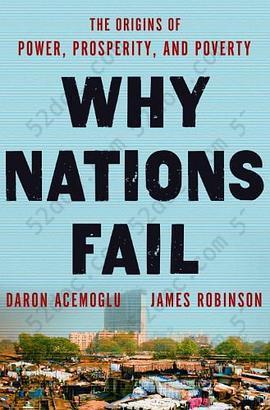注重体验与质量的电子书资源下载网站
分类于: 职场办公 互联网
简介

Why Nations Fail: The Origins of Power, Prosperity, and Poverty 豆 7.6分
资源最后更新于 2020-08-19 16:05:31
作者:Daron Acemoglu
出版社:Crown Business
出版日期:2012-01
ISBN:9780307719218
文件格式: pdf
标签: 政治经济学 经济学 政治 经济 制度 PoliticalEconomy Economics 政治学
简介· · · · · ·
Review
"'You will have three reasons to love this book. It's about national income differences within the modern world, perhaps the biggest problem facing the world today. It's peppered with fascinating stories that will make you a spellbinder at cocktail parties - such as why Botswana is prospering and Sierra Leone isn't. And it's a great read. Like me, you may succumb to read...
目录
Contents
Preface
Why Egyptians filled Tahrir Square to bring down Hosni Mubarak and what it means for our understanding of the causes of prosperity and poverty
1. So Close and Yet So Different
Nogales, Arizona, and Nogales, Sonora, have the same people, culture, and geography. Why is one rich and one poor?
2. Theories That Don't Work
Poor countries are poor not because of their geographies or cultures, or because their leaders do not know which policies will enrich their citizens
3. The Making of Prosperity and Poverty
How prosperity and poverty are determined by the incentives created by institutions, and how politics determines what institutions a nation has
4. Small Differences and Critical Junctures: The Weight of History
How institutions change through political conflict and how the past shapes the present
5. "I've Seen the Future, and It Works": Growth Under Extractive Institutions
What Stalin, King Shyaam, the Neolithic Revolution, and the Maya city-states all had in common and how this explains why China?s current economic growth cannot last
6. Drifting Apart
How institutions evolve over time, often slowly drifting apart
7. The Turning Point
How a political revolution in 1688 changed institutions in England and led to the Industrial Revolution
8. Not on Our Turf: Barriers to Development
Why the politically powerful in many nations opposed the Industrial Revolution
9. Reversing Development
How European colonialism impoverished large parts of the world
10. The Diffusion of Prosperity
How some parts of the world took different paths to prosperity from that of Britain
11. The Virtuous Circle
How institutions that encourage prosperity create positive feedback loops that prevent the efforts by elites to undermine them
12. The Vicious Circle
How institutions that create poverty generate negative feedback loops and endure
13. Why Nations Fail Today
Institutions, institutions, institutions
14. Breaking the Mold
How a few countries changed their economic trajectory by changing their institutions
15. Understanding Prosperity and Poverty
How the world could have been different and how understanding this can explain why most attempts to combat poverty have failed
Acknowledgments
Bibliographical Essay and Sources
References
Index
Preface
Why Egyptians filled Tahrir Square to bring down Hosni Mubarak and what it means for our understanding of the causes of prosperity and poverty
1. So Close and Yet So Different
Nogales, Arizona, and Nogales, Sonora, have the same people, culture, and geography. Why is one rich and one poor?
2. Theories That Don't Work
Poor countries are poor not because of their geographies or cultures, or because their leaders do not know which policies will enrich their citizens
3. The Making of Prosperity and Poverty
How prosperity and poverty are determined by the incentives created by institutions, and how politics determines what institutions a nation has
4. Small Differences and Critical Junctures: The Weight of History
How institutions change through political conflict and how the past shapes the present
5. "I've Seen the Future, and It Works": Growth Under Extractive Institutions
What Stalin, King Shyaam, the Neolithic Revolution, and the Maya city-states all had in common and how this explains why China?s current economic growth cannot last
6. Drifting Apart
How institutions evolve over time, often slowly drifting apart
7. The Turning Point
How a political revolution in 1688 changed institutions in England and led to the Industrial Revolution
8. Not on Our Turf: Barriers to Development
Why the politically powerful in many nations opposed the Industrial Revolution
9. Reversing Development
How European colonialism impoverished large parts of the world
10. The Diffusion of Prosperity
How some parts of the world took different paths to prosperity from that of Britain
11. The Virtuous Circle
How institutions that encourage prosperity create positive feedback loops that prevent the efforts by elites to undermine them
12. The Vicious Circle
How institutions that create poverty generate negative feedback loops and endure
13. Why Nations Fail Today
Institutions, institutions, institutions
14. Breaking the Mold
How a few countries changed their economic trajectory by changing their institutions
15. Understanding Prosperity and Poverty
How the world could have been different and how understanding this can explain why most attempts to combat poverty have failed
Acknowledgments
Bibliographical Essay and Sources
References
Index







